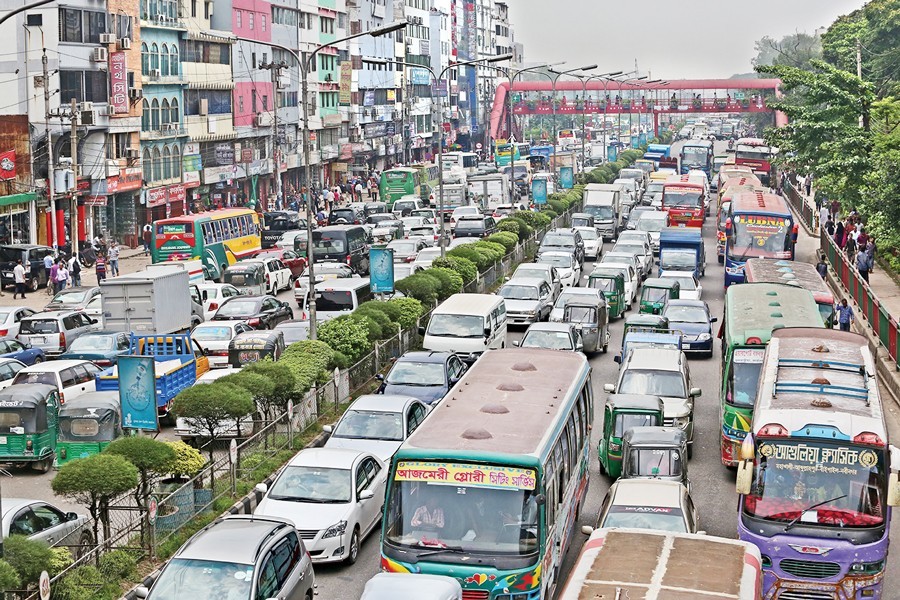
Published :
Updated :

The TomTom Traffic Index doesn't includes Dhaka, but there is little doubt that road traffic in Dhaka is one of the worst in the world. The index, an international portal, provides free access to live and historical traffic and travel information. The latest index, released early this month, covered 403 cities in 56 countries and defined congestion as 'the extra time added to road travel when traffic doesn't flow freely'. Indian mega-city Mumbai ranked first in the index while Indian capital New Delhi ranked fourth.
No matter whether Dhaka is included in the index or not, commuters in the city know very well what a nightmare traffic they are facing every day here. Some may, however, label it as a global phenomenon taking cue from the index report. It mentioned that over the past decade, 'traffic congestion has continued to increase globally.' Around 75 per cent of the cities, included in the index, experienced either increased or stable traffic congestion levels between 2017 and 2018.
Whether it is global phenomenon or not, the harsh reality is commuters are paying multiple prices for the terrible traffic in Dhaka. They are spending extra hours on road sacrificing their time for family and leisure. They are facing mental agony and physical stress and these reduce their productivity. As a result, they are paying extra for medicine and clinical treatment.
Again, traffic congestion is taking a heavy toll on environment. Unregulated and enhanced emission of carbon by different kind of mechanised vehicles is seriously polluting the air every day. By inhaling the poisonous air, residents of the city are facing greater risk of lung damage, cardiovascular diseases and premature death, among others. In Dhaka, most of the public buses and minibuses are unfit and largely responsible for polluting the air. Increased number of cars and motorcycles are not only adding to chaotic traffic but also to polluted environment. In the first quarter of the current year, some 3627 new private cars and 23,755 new motorcycles were pressed in services in Dhaka. Then there are social disorders, especially harassment of women and children, due to bad traffic.
There is an interesting argument in favour of traffic congestion - it is considered as an indicator of strong economic activities. Some policymakers like to promote the proposition. But they ignore the fact that it comes with a high cost of environmental damage, people's physical-mental stress and socio-economic disturbance.
A number of studies have already confirmed the high cost of the disastrous impact of traffic congestion in Dhaka. For instance, Accident Research Institute (ARI) of the Bangladesh University of Engineering and Technology (BUET) unveiled an estimate last year. It showed that five million work hours are lost annually to traffic congestion and there is a waste of Tk 370.00 billion every year. And a World Bank report mentioned last year that the terrible traffic congestion in Dhaka brought down the average driving speed to seven kilometres per hour currently which was 21 kilometres a decade ago.
There is little room to ignore the high cost of traffic congestion. Big projects like construction of elevated express way and introduction of Bus Rapid Transit (BRT) are unlikely to reduce the congestion in near future. Rather, integrated rail and bus networks under a well-planned and well-managed public transport using the existing infrastructure may reduce the cost significantly.


 For all latest news, follow The Financial Express Google News channel.
For all latest news, follow The Financial Express Google News channel.